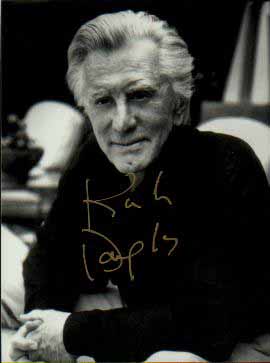

Climbing the Mountain: My Search for Meaning
From Publisher's Weekly:
After his near-fatal helicopter crash in 1991, legendary actor Douglas was
driven to examine why he, an elderly man, had survived an accident that
killed a couple of younger men. This led him back to his Jewish roots,
which in turn led him to question his own identity: Was he Kirk Douglas,
world-famous movie star, or Issur Danielovitch, the scrappy Jewish kid from
Amsterdam, New York? The result is the actor's sixth book (after an
autobiography, The Ragman's Son, and four novels), which aspires to be a
family history, a spiritual quest and a name-dropping celebrity memoir all
at once. Folksy interpretations of the Torah are intermixed with a sort of
running apology to his sons for not being a better father, along with brief
stories of Douglas's film career and his famous friends. One poignant yet
amusing chapter features Douglas weeding out his address book (Brando is
dropped, Anthony Quinn stays), while another relates the aging star's
frustration at having to audition for a part he didn't get (in Wrestling
Ernest Hemingway) and his badly disguised pleasure when the movie flopped.
Much of the book is about the actor's amazement at turning 80, and his
frustration with his failing physical powers, especially with his stroke
last year. Though the various strands of the book never quite come
together, its awkwardness is in fact its greatest charm. There's little trace
of a ghostwriter here; by turns feisty, sentimental, grouchy, funny,
boastful and touchingly vulnerable, the voice throughout is unmistakably that of
Kirk Douglas. Photos. 100,000 first printing. (Sept.) -Publisher's Weekly
From The Publisher:
With the simple power and astonishing candor that made his 1988
autobiography, The Ragman's Son, a number one international bestseller,
Kirk Douglas now shares his quest for spirituality and Jewish identity --
and his heroic fight to overcome crippling injuries and a devastating stroke.
On February 13, 1991, at the age of seventy-four, Kirk Douglas, star of
such major motion-picture classics as Champion, Spartacus, and Paths of
Glory, was in a helicopter crash, in which two people died and he himself
sustained severe back injuries with debilitating long-term effects. As he
lay in the hospital recovering, haunted by the tragedy, he kept wondering:
Why had two younger men, whose lives were in front of them, died while he,
who had already lived his life fully, survived?
The question drove this son of a Russian-Jewish ragman to a search for his
roots and on a long journey of self-discovery -- a quest not only for the
meaning of life and his own relationship with God, but for his own identity
as a Jew. Through the study of Torah, Kirk Douglas found a new spirituality
and purpose to life. His newfound faith deeply enriched his relationship
with his own children and taught him -- a man who had always been famously
demanding and impatient -- to listen to others and, above all, to hear his
own inner voice.
With the narrative skill that has made him a successful novelist, Kirk
Douglas not only takes the reader through his own near-death experience but
tells the story of his stubborn struggle to make sense of his own life, to
come to terms with the reality of death, and to answer the "big questions"
that eventually confront us all: What is the meaning of life? Why are we
here? Who is God?